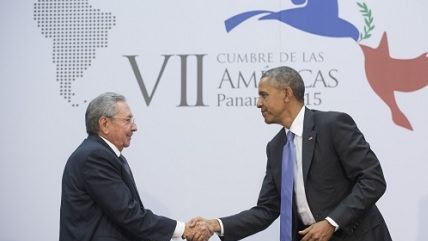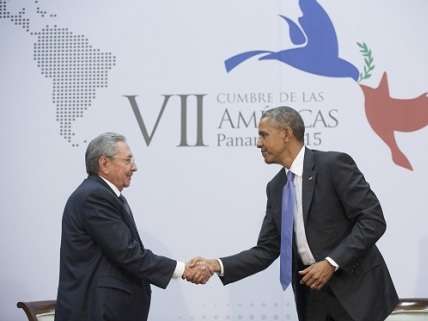Cuba Being Removed From State Sponsors of Terrorism List
The process to certify Cuba hasn't supported terrorism in the last six months has taken more than four already


The White House has submitted documentationin support of removing Cuba from the State Department's list of state sponsors of terrorism, on which it's been for more than 33 years, longer than any country but Syria, which was placed on the list in 1979. The other two countries on the State Department's list, Iran and Sudan, were placed there in 1984 and 1993. Cuba's placement on the list, like the Cold War era sanctions, have done nothing to improve the situation in Cuba or advance any of the U.S.'s stated goals.
The White House is in the process of "certifying" that Cuba hasn't sponsored any terrorist acts in the last six months, a process it began back in December, when Jacob Sullum explained the State Department's list is driven by politics, not facts, and that there's been little evidence Cuba is still involved in international terrorism. Nevertheless only the Secretary of State can remove a country from the list, not a lack of evidence.
Last week, Sen. Marco Rubio (R-Fla.), now running for president, called the White House's move toward normalizing relations with Cuba, including removing it off the terrorism list, "ridiculous," arguing Cuba was still supporting terrorism. Via The Hill:
"It doesn't make sense," he added. "I don't see how they can rationalize taking them off the list, other than the president's desire to achieve a legacy issue that he's the one that opened up Cuba and changed fifty years of policy."
Rubio cited Cuba's spying and aid of known terrorist groups as proof of Obama's missteps. The Castro regime's actions, he charged, displayed clear hostility towards the U.S.
"This is the country that is the third most active espionage force in America today, operating against us, [and also has] military officials who have been indicted in federal court for the murder of U.S. citizens over international waters," Rubio said.
So other than fixing a decades old failed policy of sanctions that's done nothing to move the needle on relations between U.S. and Cuba, Rubio doesn't see the point.
And while Rubio didn't say where he got his "third most active espionage force in America today" information, it can be sourced, in NSA documents obtained by The Intercept. According to their reporting, that list includes China in first, Russia in second, Israel in fourth, and Iran in fifth. The list is rounded out by Pakistan, North Korea, France, Venezuela, and South Korea. By someone's definition, most of these countries could be accused of sponsoring terrorism or terrorist/paramilitary/insurgency groups lumped under the broad category of "international terrorism."
How many would Rubio put on the list? The senator hasn't released a statement on the White House's announcement—there's been no answer at Rubio's DC office and the voice mailbox has been full. Rubio's campaign website calls Cuba "proven state sponsors of terrorism" but the campaign hasn't responded to a request for comment yet. Neither does it appear Rubio's relative youth will mean a more adept use of social media to stay on top of issues. There's been no statement on the Cuba terrorism news on his Twitter account either, where the latest tweet and retweet are both about campaign t-shirt sales.


Show Comments (48)